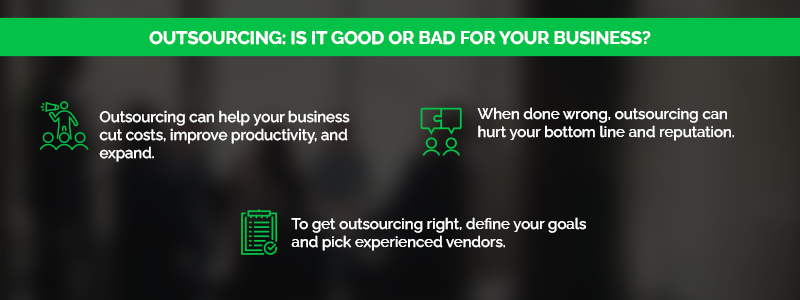Outsourcing: Is it Good or Bad for Your Business?


Businesses often turn to outsourcing to scale or cut costs. Is outsourcing good for your business? What are the potential pitfalls? How do you outsource properly? Continue reading for answers.
Outsourcing entails hiring third parties to provide specific goods and services instead of producing them in-house. Manufacturers have long used outsourcing to reduce production costs. Now, firms across a wide range of industries are outsourcing various business processes, including customer service, accounting, sales, and marketing.
In this post, we'll evaluate outsourcing, picking apart its pros and cons. We'll also show you how to do it successfully.
Outsourcing: the pluses
Below are reasons why some companies swear by outsourcing:
Cost savings
Outsourcing cuts costs without reducing productivity. For example, a software developer can outsource work to freelancers all over the world instead of hiring in-house workers. These remote workers will not require office space and may not receive full benefits, making them cheaper than full-time employees.
Focus on core tasks
One of the challenges of growing a business is that, as the number of tasks increases, and you might lose sight of core competencies. Outsourcing peripheral jobs can help you optimize resources and focus on your strengths.
For example, a company providing marketing services may soon be inundated with administrative duties as the business grows. That company will be best served by hiring another company to help with recruitment, data management, payroll, and accounting.
Staffing flexibility
Your business will rise or fall based on your employees. Assembling the right team for specific tasks can be difficult. Your best bet is engaging outsourcing firms, which often offer ample talent and experience from their ranks.
Also, outsourcing saves you the trouble of hiring employees you don't need. For example, during tax season, a company’s accounting department may be swamped. Rather than hiring workers who’ll become redundant after tax time, you can outsource the extra work to a freelancer or a tax firm.
Efficiency and productivity
Outsourcing companies are typically high-level, niche firms that have years of experience delivering a service. If you hire them, this experience and expertise saves you the trouble of starting from scratch. For example, a company can hire a proven customer-call center to handle all their calls and orders. The call center is likely equipped with the tools, resources, and personnel to ensure customer satisfaction.
Business expansion
If you want to expand your business to new locations, especially to different continents, you'll need to outsource. Instead of spending thousands relocating, outsourcing reduces startup costs.
Outsourcing: the challenges
Now that we've reviewed the benefits of outsourcing, let's delve into its potential pitfalls.
Unforeseen and hidden costs
Outsourcing contracts may seem cutthroat; be wary of hidden and unforeseen costs. These costs could include hardware or software upgrades, redeployment, or after-hours troubleshooting.
Unfortunately, outsourcing costs can accumulate and surpass the price tag of an in-house team. Calculate what resources it would take to complete the tasks you’re considering outsourcing.
If you decide to outsource, compare prices from different companies. You might be tempted to choose the company with the lowest price. However, there are many hidden costs. Financial and legal experts can help you understand the fine print and potential risks.
Data breaches
In this age of rampant security breaches, outsourcing could easily hand your data to the wrong people. Depending on the jobs you're farming out, you may have to share sensitive data and information about your work and clients. For example, a call center is likely to have a lot of details about a company's customers.
Thoroughly vet outsourcing companies before partnering. Learn their cybersecurity policies and practices, and ensure they are not vulnerable to scammers and hackers.
Risk of public backlash
Outsourcing is controversial; some consumers don't like companies that outsource. For example, outsourcing may mean closing some departments – a move that can be met with public anger.
In addition, if you're outsourcing to companies in areas where wages are low, it might seem like you're taking advantage of those people.
Tips for outsourcing right
Despite the disadvantages of outsourcing, it's still a great choice if you do it well. Here are some handy tips to ensure that you enjoy outsourcing’s benefits:
- Decide on which jobs you want to outsource and how it aligns with sales goals.
- Choose outsourcing partners with care. Vet them as though you're hiring a new employee.
- Go through the fine print of the contract to ensure you don't miss any details. Be careful about long contracts without no exit clauses.
- Set up systems to monitor and evaluate the performance of the outsourcing company.
- Periodically review the firm and see if their output matches your goals. If not, consider other vendors.
MetaGrowth Can Help
Your business’ success reflects the quality of your sales team. Building an in-house sales team can be tricky and time-consuming, especially if you want to scale. You’ll be better off outsourcing your sales-team building.
MetaGrowth can do the heavy-lifting for you. We’re skilled at hiring and training best-in-class salespersons to help you smash your sales targets. We also provide coaching and consulting services to refine your business processes. Contact us to get started.
Written by
Joe Arioto
